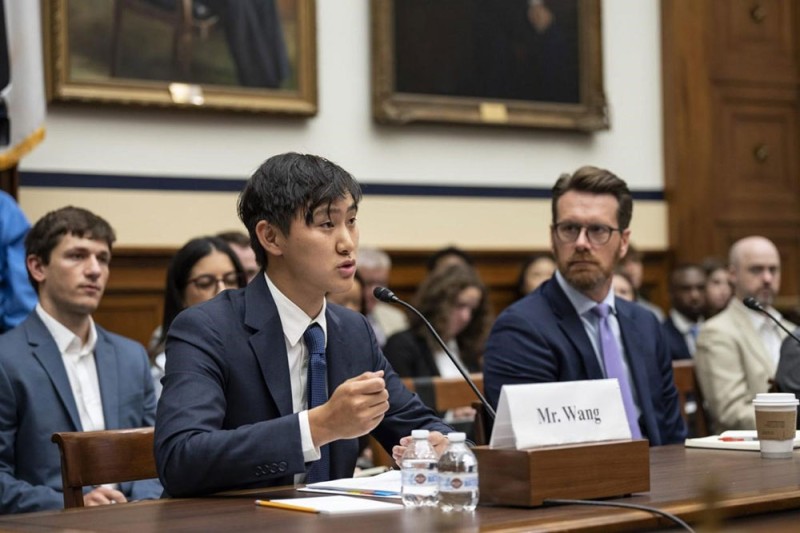
汪滔在24岁成为全球最年轻的白手起家的亿万富翁,如今28岁的他正执掌一项硅谷最雄心勃勃的AI项目。入职Meta公司仅60天,他就组建了百人实验室。他向TBPN主持人约翰·库根和乔迪·海斯描述说,这个实验室“比其他任何实验室都更小,但人才密度更高”。他的目标直指超级智能。
汪滔从他对整个行业的宏观视角出发,为青少年尤其是刚进入中学的Alpha世代提出建议:别再把时间花在游戏、运动或传统课外兴趣爱好上。
他近期在接受TBPN采访时表示:“如果你13岁左右,就应该将所有时间投入氛围编程。这才是应有的生活方式。”
世代机遇
对汪滔而言,逻辑很简单。包括他在内的所有工程师正在编写的代码,都将在五年内过时。
他表示:“毫不夸张地说,我此生编写过的所有代码都将被人工智能模型生成的代码取代。”
他自称,这种认知令他“因AI编程而变得激进”。当下最重要的不是语法或学习特定语言,而是投入时间实验和驾驭AI工具。
汪滔表示:“这是真正意义上的颠覆性时刻。若你花费一万小时钻研这些工具,掌握比他人更精湛的使用技巧,你便会获得巨大优势。”
青少年与成年人相比具有明显优势:他们拥有足够的时间与自由去深入探索新技术。过去具有创业家精神的青少年会利用这些时间当“炒鞋贩子”或运营《我的世界》(Minecraft)服务器,但汪滔强调现在他们应该将重点转向编程。
他将此刻与PC革命爆发前夕相提并论。比尔·盖茨和马克·扎克伯格这样的人物之所以拥有“巨大优势”,只是因为他们在成长过程中便不断调试和改进早期的计算机。
汪滔表示:“当下正是这样的一个时刻。投入最多时间的人将在未来经济中占据先机。”
超级智能建设
汪滔毫不讳言Meta公司的雄心。他称该公司的基础设施、规模与产品分销能力都是无与伦比的。
他表示:“我们的商业模式足以支撑构建耗资数千亿美元的计算系统。”
他刻意将团队控制在百余人规模,力求比竞争对手“更精简且人才密度更高”。汪滔表示,“其他实验室的规模可能比我们大十余倍”,但他们的实验室拥有“顶尖”程序员。
实验室分为三大支柱:研究、产品与基础设施。汪滔表示,研究部门构建的模型将“最终实现超级智能”;产品部门确保通过Meta的平台将模型推广给数十亿用户;而基础设施部门专注于建设他所说的“全球最大数据中心”。
汪滔对硬件特别感兴趣。与如今许多Meta高管一样,他将公司新推出的智能眼镜(演示场面颇具喜剧性浮夸风格)称为"超级智能的天然交付机制"。
这些贴近人类感官的设备将使数字感知与认知相融合。
汪滔表示:“这真的会让人感觉像是提升了认知能力。让超级智能常伴身旁,相当于提升100点智商。”
氛围编程的价值何在?
氛围编程是这场变革的缩影:通过自然语言提示生成并迭代代码。用户无需编写复杂语法,只需描述意图,AI便能生成可运行的原型。
这一概念正风靡硅谷高管层。Klarna首席执行官塞巴斯蒂安·西米亚特科夫斯基表示,如今他仅需20分钟就能完成创意测试,无需耗费数周工程周期。谷歌(Google)首席执行官桑达尔·皮查伊透露,公司30%以上的新代码已由AI生成,称这是25年来软件开发领域的最大飞跃。
汪滔的见解更为深入。他认为氛围编程不仅是一种生产力工具,更是一种面向未来的文化使命。重要的不是代码本身,而是通过不断挑战AI工具的极限所积累的大量直觉经验,这正是他敦促Alpha世代尽早开始学习的原因。
他表示:“工程师的角色定位与过去已经截然不同。”(*)
译者:刘进龙
审校:汪皓
汪滔在24岁成为全球最年轻的白手起家的亿万富翁,如今28岁的他正执掌一项硅谷最雄心勃勃的AI项目。入职Meta公司仅60天,他就组建了百人实验室。他向TBPN主持人约翰·库根和乔迪·海斯描述说,这个实验室“比其他任何实验室都更小,但人才密度更高”。他的目标直指超级智能。
汪滔从他对整个行业的宏观视角出发,为青少年尤其是刚进入中学的Alpha世代提出建议:别再把时间花在游戏、运动或传统课外兴趣爱好上。
他近期在接受TBPN采访时表示:“如果你13岁左右,就应该将所有时间投入氛围编程。这才是应有的生活方式。”
世代机遇
对汪滔而言,逻辑很简单。包括他在内的所有工程师正在编写的代码,都将在五年内过时。
他表示:“毫不夸张地说,我此生编写过的所有代码都将被人工智能模型生成的代码取代。”
他自称,这种认知令他“因AI编程而变得激进”。当下最重要的不是语法或学习特定语言,而是投入时间实验和驾驭AI工具。
汪滔表示:“这是真正意义上的颠覆性时刻。若你花费一万小时钻研这些工具,掌握比他人更精湛的使用技巧,你便会获得巨大优势。”
青少年与成年人相比具有明显优势:他们拥有足够的时间与自由去深入探索新技术。过去具有创业家精神的青少年会利用这些时间当“炒鞋贩子”或运营《我的世界》(Minecraft)服务器,但汪滔强调现在他们应该将重点转向编程。
他将此刻与PC革命爆发前夕相提并论。比尔·盖茨和马克·扎克伯格这样的人物之所以拥有“巨大优势”,只是因为他们在成长过程中便不断调试和改进早期的计算机。
汪滔表示:“当下正是这样的一个时刻。投入最多时间的人将在未来经济中占据先机。”
超级智能建设
汪滔毫不讳言Meta公司的雄心。他称该公司的基础设施、规模与产品分销能力都是无与伦比的。
他表示:“我们的商业模式足以支撑构建耗资数千亿美元的计算系统。”
他刻意将团队控制在百余人规模,力求比竞争对手“更精简且人才密度更高”。汪滔表示,“其他实验室的规模可能比我们大十余倍”,但他们的实验室拥有“顶尖”程序员。
实验室分为三大支柱:研究、产品与基础设施。汪滔表示,研究部门构建的模型将“最终实现超级智能”;产品部门确保通过Meta的平台将模型推广给数十亿用户;而基础设施部门专注于建设他所说的“全球最大数据中心”。
汪滔对硬件特别感兴趣。与如今许多Meta高管一样,他将公司新推出的智能眼镜(演示场面颇具喜剧性浮夸风格)称为"超级智能的天然交付机制"。
这些贴近人类感官的设备将使数字感知与认知相融合。
汪滔表示:“这真的会让人感觉像是提升了认知能力。让超级智能常伴身旁,相当于提升100点智商。”
氛围编程的价值何在?
氛围编程是这场变革的缩影:通过自然语言提示生成并迭代代码。用户无需编写复杂语法,只需描述意图,AI便能生成可运行的原型。
这一概念正风靡硅谷高管层。Klarna首席执行官塞巴斯蒂安·西米亚特科夫斯基表示,如今他仅需20分钟就能完成创意测试,无需耗费数周工程周期。谷歌(Google)首席执行官桑达尔·皮查伊透露,公司30%以上的新代码已由AI生成,称这是25年来软件开发领域的最大飞跃。
汪滔的见解更为深入。他认为氛围编程不仅是一种生产力工具,更是一种面向未来的文化使命。重要的不是代码本身,而是通过不断挑战AI工具的极限所积累的大量直觉经验,这正是他敦促Alpha世代尽早开始学习的原因。
他表示:“工程师的角色定位与过去已经截然不同。”(*)
译者:刘进龙
审校:汪皓
Alexandr Wang — who became the world’s youngest self-made billionaire at 24 — is now, at 28, running one of the most ambitious AI efforts in Silicon Valley. In his first 60 days at Meta, he built a 100-person lab he described to TBPN hosts John Coogan and Jordi Hayes as “smaller and more talent dense than any of the other labs.” His goal: nothing less than superintelligence.
Wang, with his aerial view of the industry, has advice for kids, especially those in Gen Alpha now entering middle school: Forget gaming, sports, or traditional after-school hobbies.
“If you are like 13 years old, you should spend all of your time vibe coding,” he said in his recent TBPN interview. “That’s how you should live your life.”
A generational moment
For Wang, the reasoning is simple. Every engineer, himself included, is now writing code that he believes will be obsolete within five years.
“Literally all the code I’ve written in my life will be replaced by what will be produced by an AI model,” he said.
That realization has left him, in his words, “radicalized by AI coding.” What matters most now isn’t syntax, or learning a particular language, but time spent experimenting with and steering AI tools.
“It’s actually an incredible moment of discontinuity,” Wang said. “If you just happen to spend 10,000 hours playing with the tools and figuring out how to use them better than other people, that’s a huge advantage.”
Teenagers have a clear advantage over adults: time and freedom to immerse themselves in new technology. And while in the past, entrepreneurial teenagers leveraged this time to be “sneaker flippers” or run Minecraft servers, Wang says the focus should now be on the code.
He compares the moment to the dawn of the PC revolution. The Bill Gateses and Mark Zuckerbergs of the world had an “immense advantage” simply because they grew up tinkering with the earliest machines.
“That moment is happening right now,” Wang said. “And the people who spend the most time with it will have the edge in the future economy.”
Building for superintelligence
Wang isn’t coy about Meta’s ambitions. He calls the company’s infrastructure, scale, and product distribution unmatched.
“We have the business model to support building literally hundreds of billions of dollars of compute,” he said.
His team, just over 100 people, is deliberately designed to be “smaller and more talent dense” than rivals. “The other labs are like 10 times bigger,” Wang said, but their lab had “cracked” coders.
The lab is split into three pillars: research, product, and infrastructure. Research builds the models Wang says will “ultimately be superintelligent.” Product ensures they get distributed across billions of users through Meta’s platforms. And infrastructure focuses on what he calls “literally the largest data centers in the world.”
Wang is particularly excited about hardware. Like many Meta executives now, he points to the company’s new smart glasses, which had a hilariously foppish demo, as the “natural delivery mechanism for superintelligence.”
Placed right next to the human senses, they will merge digital perception with cognition.
“It will literally feel like cognitive enhancement,” Wang said. “You will gain 100 IQ points by having your superintelligence right next to you.”
Why vibe coding matters
Vibe coding is the shorthand for this shift: using natural language prompts to generate and iterate on code. Rather than writing complex syntax, users describe their intent, and AI produces functioning prototypes.
The concept is spreading across Silicon Valley’s C-suites. Klarna CEO Sebastian Siemiatkowski has said he can now test ideas in 20 minutes, instead of burning weeks of engineering cycles. Google CEO Sundar Pichai revealed that AI already generates more than 30% of new code at the company, calling it the biggest leap in software creation in 25 years.
Wang takes that further. For him, vibe coding isn’t just a productivity hack, but a future cultural mandate. What matters isn’t the code itself — it’s the hours of intuition-building that come from pushing AI tools to their limits, which is why he urges Gen Alpha to start early.
“The role of an engineer is just very different now than it was before,” he said.

